Axiomatic Read online
Page 9
A moment’s introspection each morning showed that this mystical transformation had not yet taken place. I went on a hunger strike, hoping to hasten my victorious emergence from the crucible of suffering by turning up the heat. I wasn’t force-fed, or even given intravenous protein. I was too stupid to make the obvious deduction: the day of realisation was imminent.
One morning, I was handed a costume which I recognised at once from the painting. I was terrified to the point of nausea, but I put it on and went with the guards, making no trouble. The painting was set outdoors. This would be my only chance to escape.
I’d hoped we would have to travel, with all the opportunities that might have entailed, but the landscape had been prepared just a few hundred metres from the building I’d been kept in. I blinked at the glare from the thin grey clouds that covered most of the sky (had Lindhquist been waiting for them, or had he ordered their presence?), weary, frightened, weaker than ever thanks to not having eaten for three days. Desolate fields stretched to the horizon in all directions. There was nowhere to run to, nobody to signal to for help.
I saw Catherine, already sitting in place on the edge of a raised stretch of ground. A short man—well, shorter than the guards, whose height I’d grown accustomed to—stood by her, stroking her neck. She flicked her tail with pleasure, her eyes half closed. The man wore a loose white suit, and a white mask, rather like a fencing mask. When he saw me approaching, he raised his arms in an extravagant gesture of greeting. For an instant a wild idea possessed me: Catherine could save us! With her speed, her strength, her claws.
There were a dozen armed men around us, and Catherine was clearly as docile as a kitten.
‘Mr Segel! You look so glum! Cheer up, please! This is a wonderful day!’
I stopped walking. The guards on either side of me stopped too, and did nothing to force me on.
I said, ‘I won’t do it.’
The man in white was indulgent. ‘Why ever not?’
I stared at him, trembling. I felt like a child. Not since childhood had I confronted anyone this way, without the priming drugs to calm me, without a weapon within easy reach, without absolute confidence in my strength and agility. ‘When we’ve done what you want, you’re going to kill us all. The longer I refuse, the longer I stay alive.’
It was Catherine who answered first. She shook her head, not quite laughing. ‘No, Dan! Andreas won’t hurt us! He loves us both!’
The man came towards me. Had Andreas Lindhquist faked his death? His gait was not an old man’s gait.
‘Mr Segel, please calm yourself. Would I harm my own creations? Would I waste all those years of hard work, by myself and so many others?’
I sputtered, confused, ‘You’ve killed people. You’ve kidnapped us. You’ve broken a hundred different laws.’ I almost shouted at Catherine. ‘He arranged Freda’s death!’, but I had a feeling that would have done me a lot more harm than good.
The computer that disguised his voice laughed blandly. ‘Yes, I’ve broken laws. Whatever happens to you, Mr Segel, I’ve already broken them. Do you think I’m afraid of what you’ll do when I release you? You will be as powerless then to harm me as you are now. You have no proof as to my identity. Oh, I’ve examined a record of your inquiries. I know you suspected me—’
‘I suspected your son.’
‘Ah. A moot point. I prefer to be called Andreas by intimate acquaintances, but to business associates, I am Gustave Lindhquist. You see, this body is that of my son—if son is the right word to use for a clone—but since his birth I took regular samples of my brain tissue, and had the appropriate components extracted from them and injected into his skull. The brain can’t be transplanted, Mr Segel, but with care, a great deal of memory and personality can be imposed upon a young child. When my first body died, I had the brain frozen, and I continued the injections until all the tissue was used up. Whether or not I “am” Andreas is a matter for philosophers and theologians. I clearly recall sitting in a crowded classroom watching a black and white television, the day Neil Armstrong stepped on the moon, fifty-two years before this body was born. So call me Andreas. Humour an old man.’
He shrugged. ‘The masks, the voice filters—I like a little theatre. And the less you see and hear, the fewer your avenues for causing me minor annoyance. But please, don’t flatter yourself; you can never be a threat to me. I could buy every member of your entire force with half the amount I’ve earnt while we’ve been speaking.
‘So forget these delusions of martyrdom. You are going to live, and for the rest of your life you will be, not only my creation, but my instrument. You are going to carry this moment away inside you, out into the world for me, like a seed, like a strange, beautiful virus, infecting and transforming everyone and everything you touch.’
He took me by the arm and led me towards Catherine. I didn’t resist. Someone placed a winged staff in my right hand. I was prodded, arranged, adjusted, fussed over. I hardly noticed Catherine’s cheek against mine, her paw resting against my belly. I stared ahead, in a daze, trying to decide whether or not to believe I was going to live, overcome by this first real chance of hope, but too terrified of disappointment to trust it.
There was no one but Lindhquist and his guards and assistants. I don’t know what I’d expected; an audience in evening dress? He stood a dozen metres away, glancing down at a copy of the painting (or perhaps it was the original) mounted on an easel, then calling out instructions for microscopic changes to our posture and expression. My eyes began to water, from keeping my gaze fixed; someone ran forward and dried them, then sprayed something into them which prevented a recurrence.
Then, for several minutes, Lindhquist was silent. When he finally spoke, he said, very softly, ‘All we’re waiting for now is the movement of the sun, the correct positioning of your shadows. Be patient for just a little longer.’
I don’t remember clearly what I felt in those last seconds. I was so tired, so confused, so uncertain. I do remember thinking: How will I know when the moment has passed? When Lindhquist pulls out a weapon and incinerates us, perfectly preserving the moment? Or when he pulls out a camera? Which would it be?
Suddenly he said, ‘Thank you,’ and turned and walked away, alone. Catherine shifted, stretched, kissed me on the cheek, and said, ‘Wasn’t that fun?’ One of the guards took my elbow, and I realised I’d staggered.
He hadn’t even taken a photograph. I giggled hysterically, certain now that I was going to live after all. And he hadn’t even taken a photograph. I couldn’t decide if that made him twice as insane, or if it totally redeemed his sanity.
* * *
I never discovered what became of Catherine. Perhaps she stayed with Lindhquist, shielded from the world by his wealth and seclusion, living a life effectively identical to that she’d lived before, in Freda Macklenburg’s basement. Give or take a few servants and luxurious villas.
Marion and I were returned to our home, unconscious for the duration of the voyage, waking on the bed we’d left six months before. There was a lot of dust about. She took my hand and said, ‘Well. Here we are.’ We lay there in silence for hours, then went out in search of food.
The next day I went to the station. I proved my identity with fingerprints and DNA, and gave a full report of all that had happened.
I had not been assumed dead. My salary had continued to be paid into my bank account, and mortgage payments deducted automatically. The department settled my claim for compensation out of court, paying me three-quarters of a million dollars, and I underwent surgery to restore as much of my former appearance as possible.
It took more than two years of rehabilitation, but now I am back on active duty. The Macklenburg case has been shelved for lack of evidence. The investigation of the kidnapping of the three of us, and Catherine’s present fate, is on the verge of going the same way; nobody doubts my account of the events, but all the evidence against Gustave Lindhquist is circumstantial. I accept that. I’m glad. I want to era
se everything that Lindhquist has done to me, and an obsession with bringing him to justice is the exact opposite of the state of mind I aim to achieve. I don’t pretend to understand what he thought he was achieving by letting me live, what his insane notion of my supposed effect on the world actually entailed, but I am determined to be, in every way, the same person as I was before the experience, and thus to defeat his intentions.
Marion is doing fine. For a while she suffered from recurring nightmares, but after seeing a therapist who specialises in de-traumatising hostages and kidnap victims, she is now every bit as relaxed and carefree as she used to be.
I have nightmares, now and then. I wake in the early hours of the morning, shivering and sweating and crying out, unable to recall what horror I’m escaping. Andreas Lindhquist injecting samples of brain tissue into his son? Catherine blissfully closing her eyes, and thanking me for saving her life while her claws rake ray body into bloody strips? Myself, trapped in The Caress; the moment of the realisation infinitely, unmercifully prolonged? Perhaps; or perhaps I simply dream about my latest case—that seems much more likely.
Everything is back to normal.
Blood Sisters
When we were nine years old, Paula decided we should prick our thumbs, and let our blood flow into each other’s veins.
I was scornful. ‘Why bother? Our blood’s already exactly the same. We’re already blood sisters.’
She was unfazed. ‘I know that. That’s not the point. It’s the ritual that counts.’
We did it in our bedroom, at midnight, by the light of a single candle. She sterilized the needle in the candle flame, then wiped it clean of soot with a tissue and saliva.
When we’d pressed the tiny, sticky wounds together, and recited some ridiculous oath from a third-rate children’s novel, Paula blew out the candle. While my eyes were still adjusting to the dark, she added a whispered coda of her own: ‘Now we’ll dream the same dreams, and share the same lovers, and die at the very same hour.’
I tried to say, indignantly, ‘That’s just not true!’ but the darkness and the scent of the dead flame made the protest stick in my throat, and her words remained unchallenged.
* * *
As Dr Packard spoke, I folded the pathology report, into halves, into quarters, obsessively aligning the edges. It was far too thick for me to make a neat job of it; from the micrographs of the misshapen lymphocytes proliferating in my bone marrow, to the print-out of portions of the RNA sequence of the virus that had triggered the disease, thirty-two pages in all.
In contrast, the prescription, still sitting on the desk in front of me, seemed ludicrously flimsy and insubstantial. No match at all. The traditional—indecipherable—polysyllabic scrawl it bore was nothing but a decoration; the drug’s name was reliably encrypted in the barcode below. There was no question of receiving the wrong medication by mistake. The question was, would the right one help me?
‘Is that clear? Ms Rees? Is there anything you don’t understand?’
I struggled to focus my thoughts, pressing hard on an intractable crease with my thumb. She’d explained the situation frankly, without resorting to jargon or euphemism, but I still had the feeling that I was missing something crucial. It seemed like every sentence she’d spoken had started one of two ways: ‘The virus…’or ‘The drug…’
‘Is there anything I can do? Myself? To… improve the odds?’
She hesitated, but not for long. ‘No, not really. You’re in excellent health, otherwise. Stay that way.’ She began to rise from her desk to dismiss me, and I began to panic.
‘But, there must be something.’ I gripped the arms of my chair, as if afraid of being dislodged by force. Maybe she’d misunderstood me, maybe I hadn’t made myself clear. ‘Should I… stop eating certain foods? Get more exercise? Get more sleep? I mean, there has to be something that will make a difference. And I’ll do it, whatever it is. Please, just tell me—’ My voice almost cracked, and I looked away, embarrassed. Don’t ever start ranting like that again. Not ever.
‘Ms Rees, I’m sorry. I know how you must be feeling. But the Monte Carlo diseases are all like this. In fact, you’re exceptionally lucky; the WHO computer found eighty thousand people, worldwide, infected with a similar strain. That’s not enough of a market to support any hard-core research, but enough to have persuaded the pharmaceutical companies to rummage through their databases for something that might do the trick. A lot of people are on their own, infected with viruses that are virtually unique. Imagine how much useful information the health profession can give them.’ I finally looked up; the expression on her face was one of sympathy, tempered by impatience.
I declined the invitation to feel ashamed of my ingratitude. I’d made a fool of myself, but I still had a right to ask the question. ‘I understand all that. I just thought there might be something I could do. You say this drug might work, or it might not. If I could contribute, myself, to fighting this disease, I’d feel…’
What? More like a human being, and less like a test tube—a passive container in which the wonder drug and the wonder virus would fight it out between themselves. ‘… better.’
She nodded. ‘I know, but trust me, nothing you can do would make the slightest difference. Just look after yourself as you normally would. Don’t catch pneumonia. Don’t gain or lose ten kilos. Don’t do anything out of the ordinary. Millions of people must have been exposed to this virus, but the reason you’re sick, and they’re not, is a purely genetic matter. The cure will be just the same. The biochemistry that determines whether or not the drug will work for you isn’t going to change if you start taking vitamin pills, or stop eating junk food—and I should warn you that going on one of those ‘miracle-cure’ diets will simply make you sick; the charlatans selling them ought to be in prison.’
I nodded fervent agreement to that, and felt myself flush with anger. Fraudulent cures had long been my bête noir—although now, for the first time, I could almost understand why other Monte Carlo victims paid good money for such things: crackpot diets, meditation schemes, aroma therapy, self-hypnosis tapes, you name it. The people who peddled that garbage were the worst kind of cynical parasites, and I’d always thought of their customers as being either congenitally gullible, or desperate to the point of abandoning their wits, but there was more to it than that. When your life is at stake, you want to fight for it—with every ounce of your strength, with every cent you can borrow, with every waking moment. Taking one capsule, three times a day, just isn’t hard enough—whereas the schemes of the most perceptive con-men were sufficiently arduous (or sufficiently expensive) to make the victims feel that they were engaged in the kind of struggle that the prospect of death requires.
This moment of shared anger cleared the air completely. We were on the same side, after all; I’d been acting like a child. I thanked Dr Packard for her time, picked up the prescription, and left.
On my way to the pharmacy, though, I found myself almost wishing that she’d lied to me—that she’d told me my chances would be vastly improved if I ran ten kilometers a day and ate raw seaweed with every meal—but then I angrily recoiled, thinking: Would I really want to be deceived ‘for my own good’? If it’s down to my DNA, it’s down to my DNA, and I ought to expect to be told that simple truth, however unpalatable I find it—and I ought to be grateful that the medical profession has abandoned its old patronizing, paternalistic ways.
I was twelve years old when the world learnt about the Monte Carlo project.
A team of biological warfare researchers (located just a stone’s throw from Las Vegas—alas, the one in New Mexico, not the one in Nevada) had decided that designing viruses was just too much hard work (especially when the Star Wars boys kept hogging the supercomputers). Why waste hundreds of PhD-years—why expend any intellectual effort whatsoever—when the time-honoured partnership of blind mutation and natural selection was all that was required?
Speeded up substantially, of course.
Th
ey’d developed a three-part system: a bacterium, a virus, and a line of modified human lymphocytes. A stable portion of the viral genome allowed it to reproduce in the bacterium, while rapid mutation of the rest of the virus was achieved by neatly corrupting the transcription error repair enzymes. The lymphocytes had been altered to vastly amplify the reproductive success of any mutant which managed to infect them, causing it to out-breed those which were limited to using the bacterium.
The theory was, they’d set up a few trillion copies of this system, like row after row of little biological poker machines, spinning away in their underground lab, and just wait to harvest the jackpots.
The theory also included the best containment facilities in the world, and five hundred and twenty people all sticking scrupulously to official procedure, day after day, month after month, without a moment of carelessness, laziness or forgetfulness. Apparently, nobody bothered to compute the probability of that.
The bacterium was supposed to be unable to survive outside artificially beneficent laboratory conditions, but a mutation of the virus came to its aid, filling in for the genes that had been snipped out to make it vulnerable.
They wasted too much time using ineffectual chemicals before steeling themselves to nuke the site. By then, the winds had already made any human action—short of melting half a dozen states, not an option in an election year—irrelevant.
The first rumours proclaimed that we’d all be dead within a week. I can clearly recall the mayhem, the looting, the suicides (second-hand on the TV screen; our own neighbourhood remained relatively tranquil—or numb). States of emergency were declared around the world. Planes were turned away from airports, ships (which had left their home ports months before the leak) were burnt in the docks. Harsh laws were rushed in everywhere, to protect public order and public health.

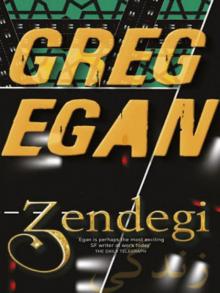 Zendegi
Zendegi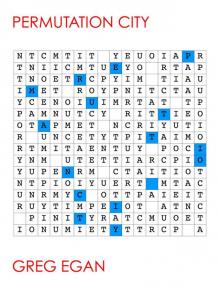 Permutation City
Permutation City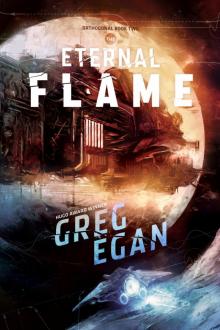 The Eternal Flame
The Eternal Flame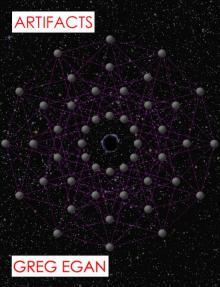 Artifacts
Artifacts Wang's Carpets
Wang's Carpets Dichronauts
Dichronauts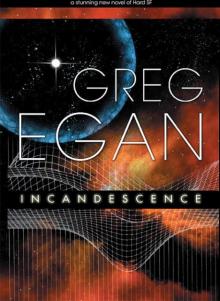 Incandescence
Incandescence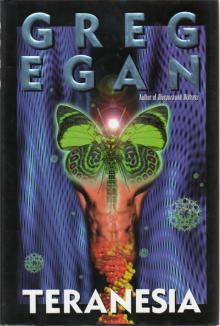 Teranesia
Teranesia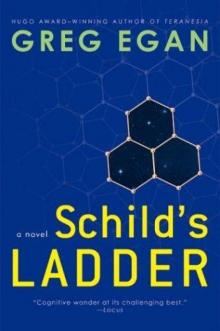 Schild's Ladder
Schild's Ladder Quarantine
Quarantine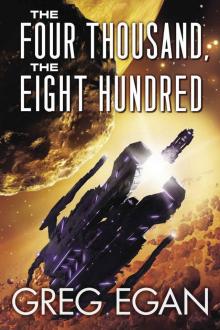 The Four Thousand, the Eight Hundred
The Four Thousand, the Eight Hundred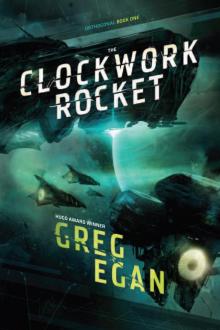 The Clockwork Rocket
The Clockwork Rocket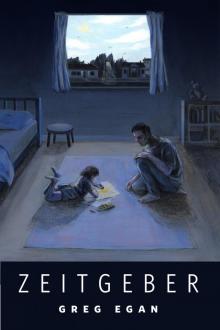 Zeitgeber
Zeitgeber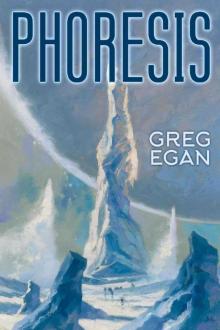 Phoresis
Phoresis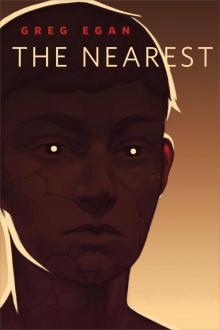 The Nearest
The Nearest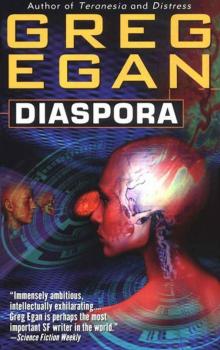 Diaspora
Diaspora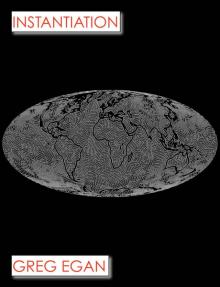 Instantiation
Instantiation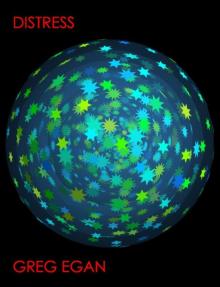 Distress
Distress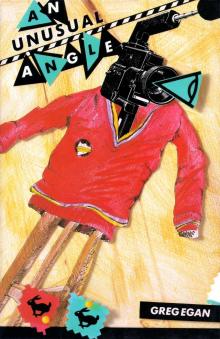 An Unusual Angle
An Unusual Angle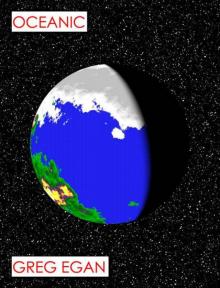 Oceanic
Oceanic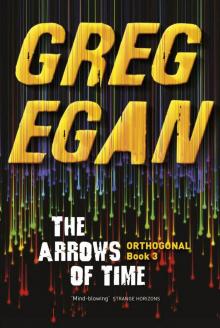 The Arrows of Time
The Arrows of Time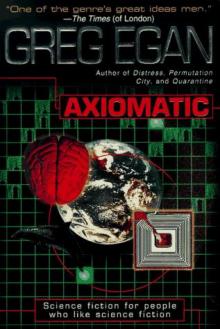 Axiomatic
Axiomatic![Anthology 2. Luminous [1998, 2010] Read online](http://i1.bookreadfree.com/i/03/18/anthology_2_luminous_1998_2010_preview.jpg) Anthology 2. Luminous [1998, 2010]
Anthology 2. Luminous [1998, 2010]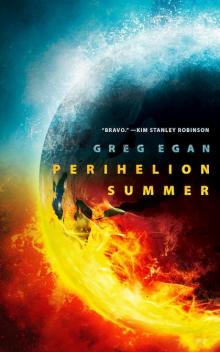 Perihelion Summer
Perihelion Summer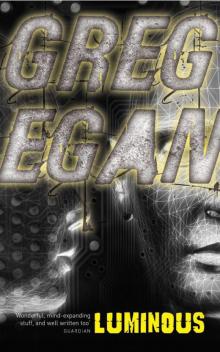 Luminous
Luminous